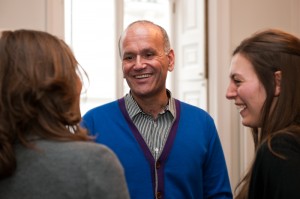July 27, 2012
My first job was selling ice cream out of a truck as a teenager and it taught me a number of useful things. First, one should sell something people want. Ice cream is a product that practically sells itself on a hot day. Second, I don’t enjoy working for people. I don’t mind working all that much, if a little effort goes a long way, and I do like making money quite a bit, but I don’t enjoy having people tell me what to do.
Over the years I’ve owned and operated many businesses, from a high tech startup in California to one of the largest software companies in the world. I’ve also invested in quite a number of other entrepreneurs running their own businesses. I think I found myself on this “road less traveled” because I was always on the look out for products and services that would sell themselves and I was always determined not to work for someone else. I think I chose, early on, to be an entrepreneur.
And I think it was a choice.
I don’t think entrepreneurs are born. I’ve met quite a number of very successful business builders and they have no common aptitude or skill set.
Some can speak clearly and well about anything. Some struggle to speak in public at all. Some are good with numbers and others hire armies of accountants because they can’t be bothered to master the inticacies of income sheets and balance statements. Some own vast businesses, some are just a one man or woman show that generates revenue so fast it can hardly be counted.
In 2008, after making a bet with a fellow entrepreneur, I taught a one day course in how to start a business. I was confident, at the time, that you only really needed a single day to master the fundamentals of owning and operating your own enterprise.
And, in fact, I still think that’s so, although many people seem to benefit from a somewhat longer course.
In those days I had six questions I thought people had to be able to answer correctly in order to be successful. Later the number balooned to twenty. Now I’ve settled on ten.
What do we do that people need or want?
Who buys what we sell?
Who are we up against?
How are we better?
Who sells it to them?
Who pays for them to have it?
How much is it worth to them?
Who is our key partner?
What’s our key asset?
What must we be good at?
Some of these questions need a little interpretation. For example, a “key partner”, in this context, is not the guy who sits next to you in your first tiny office.
A key partner is another business that can help your company grow very quickly. If, for example, you can get McDonald’s to manufacture and pass out plastic toys that show one of your cartoon characters, your new animated feature is likely to sell a lot of tickets at the theater box office. We would call McDonald’s a key partner.
That said, most of the questions are self explanatory and they can be summed up by the statement “A business will be successful when it can sell people something they want, where they want to buy it, at the price they want to pay.”
Answering these questions correctly isn’t difficult. If you’re selling a product like ice cream, which is something lots of people really do want, it can be very easy.
If you’re selling a product that people have to understand to want, like a software application, it can be more complex. If not many people want, or can afford, to buy what you sell, it can be more complex. If your product is hard to deliver, because it is too big, too small, too expensive to produce in advance of the sale, it can be more complex.
Every startup has its challenges and sometimes when they are too many you decide to abandon one new business so you can start another that’s easier and more profitable from inception.
I think learning how to answer these questions correctly is about as difficult as learning how to get a good job.
I make an effort to reach out to student audiences and to people who are making mid-life transitions because I think many of them, like me, will find they enjoy building enterprises as much or more than they enjoy shopping for employment. I also think they benefit, and society at large benefits, when they know they have a choice.
Because I learned how to start a business young I’ve never been out of work. From time to time, in the past, I’ve taken a job (like serving as CEO for Micrographx), but I’ve always had the freedom to create work for myself and others as well.
In starting School for Startups I’ve sought to simply, quickly, effectively teach people how to create strong, successful, profitable enterprises. I’ve wanted to give people the same choices I’ve had.
To date our social enterprise has trained well over fifteen thousand people worldwide through our programs, and we’ve provided support through articles and videos to many hundreds of thousands more. I like to think we will go on to train millions who will create wealth for themselves by creating products and services that their customers love.






